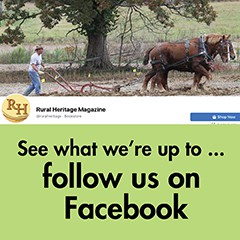I could use some thoughts from some of you more experienced folks. Some of you know about our team, originally purchased from Dris (would love to hear your thoughts here as well, Dris!) Nice team of young (6 and 7 this year), 18.1-2 hand Belgian geldings. Well trained and fairly well conditioned. We use them regularly (several times a week), but rarely do they work hard with heavy pulling for long periods of time. That being said, we have been asked to work a trolley service for the state fair this year. It is an AWESOME opportunity for us and our side business of carriage/wagon rides, not to mention a potentially great income. HOWEVER, it also happens to be in late-August, often our hottest time of year.
Prior to this week and for the last few months, the horses have been hitched and pulling very heavy loads for short periods of time combined with lighter or wheeled loads for up to a couple of hours, about 3 times a week. This week, we began intensifying their work in preparation for the fair. I have been doing roughly 5 mile wagon rides on hilly county roads (both paved and gravel) 3 times per week. One of the team is also getting a couple 9 mile trail rides mixed in. Next week, I plan to increase it to 7-8 mile wagon rides 3-4 times for a week or so, followed by a few 10 mile runs into town to remind them of city work (which they've done many times before, just not in the last few months). Our rides are primarily in the mid-morning hours, when vehicular traffic is lighter, though I'm hoping the blacktop asphalt helps condition them to the heat. Temperatures during our rides are running in the 80's right now, plus humidity. They're doing fine at this point, and other than being on the slow and not-excitable side, they don't seem tired at all.
Assuming the fair works out as planned, we will be doing 2, 3-hour sessions, with about 6 miles during each session of rides (so 12 miles a day total). Essentially, they are scheduled for rides from 10-1, and then 5-8 pm, resting in between. They will be working 4 days, have a day off, then work 7. I have always errored on the side of caution when working horses, so this seems like I will be pushing their limits. I am nervous about over-doing it. We did require that the fair provide us stalls on the grounds, to save the horses the stress of transport every day. I have several questions......
--currently they eat free-choice grass hay and about 6 quarts of oats per day, and look great weight wise. We were thinking of adding alfalfa pellets several times per day through these weeks, and upping the oats as the work increases. I am a bit worried about weight loss, as they are in great shape now, but don't have much to lose. Would you do anything differently?
--The fair route is mostly on asphalt or concrete. Assuming our normal 80-95% humidity, what temperatures would you stop working, or what signs of heat stress would you look for to stop the horses?
--I have been using the large harness net combined with a light fly spray to reduce fly stress. It's black, but that shouldn't add any heat stress to them as open as the net is, right?
--We are going to start re-adding their apple cider vinegar to their water to alter the flavor/smell slightly so they are more willing to drink the city water. Should I worry about pushing the fluids in other ways (such as soaked pellets) for such a work load?
--Is there anything I'm forgetting?
Thanks in advance for the thoughts!

A Bi-Monthly Magazine
Borrowing From Yesterday To Do the Work Of Today
Offering Resources to Promote Self-Sufficient & Back-to-the-Land Living
- latest reply 7 years ago
7 years ago

Klaus Karbaumer says 2016-07-29 14:41:47 (CST)
First of all, my respect to you, because you are already thinking about a very broad range of things to watch for and to be careful about. Secondly, you are preparing your horses well.
Is the area flat or hilly that you will be working in ? If flat, then well prepared horses won't be challenged too much, since it is only a initial strain to get the load rolling. If hilly, much depends on how steep the hills are. I do not have to tell you obviously about breathing and heart rates, you know that and can watch it. And I am sure that you know that one has to watch if and how much the horses sweat or if they stop sweating- the latter would be dangerous in hot weather. Just like with people , sufficient hydration is very important. I frankly wouldn't do any extended work in over 92 degree heat index weather and what is very important nowadays , you'll have to watch for how the public perceives the horses working in heat. Many people see the worst already when the horses are sweating healthily, others see the number of people on board. What you don't want is ruining your reputation.
Best of luck to you and your horses!
7 years ago via Forums | Front Porch Forum




 1
1

